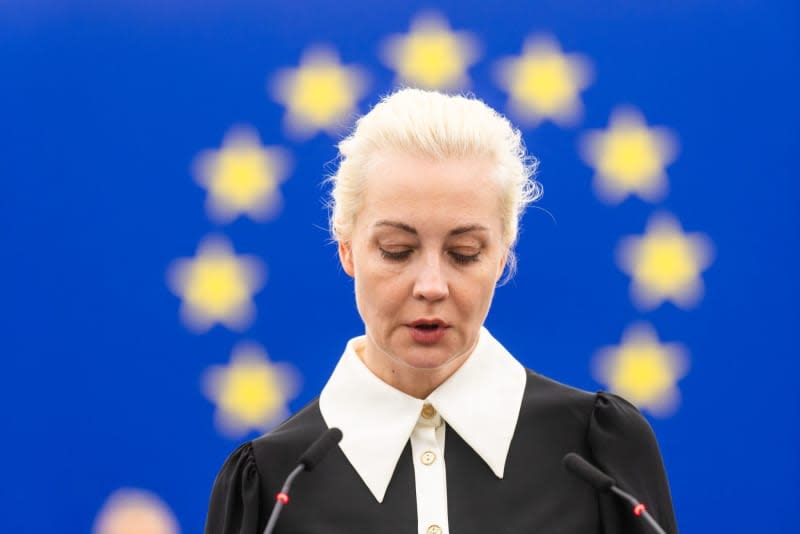Navalny's widow warns of arrests at her husband's funeral in Moscow

- Oops!Something went wrong.Please try again later.
- Oops!Something went wrong.Please try again later.
The widow of the late Kremlin critic Alexei Navalny warned mourners on Wednesday that the Russian police might arrest those paying their respects to her husband at his funeral in Moscow on Friday.
"I'm not sure yet whether it will be peaceful or whether police will arrest those who have come to say goodbye to my husband," Yulia Navalnaya told the European Parliament in Strasbourg, France.
Navalnaya told the EU legislature that her husband was tortured and killed on the order of Russian President Vladimir Putin. "Even after that, they abused his body and abused his mother," she said.
His mother Lyudmila Navalnaya had been pressing Russian authorities to hand over her son's body, which they finally did on Saturday - more than a week after his death was reported.
She said they were pressuring her to agree to a private burial in the arctic locale but she refused.
On Wednesday, Navalny's team announced that there will first be a funeral service in a church in the south-eastern district of Marjino on Friday, followed by the burial at a nearby cemetery.
Navalny's team announced earlier this week that they were having difficulties finding a venue for the funeral service.
The time it took Russian authorities to hand over the body runs counter to the Russian Orthodox tradition, which calls for bodies to be laid out beforehand so mourners can say goodbye and for the deceased to be buried after three days.
This ritual was not made available to Navalny, wrote Ivan Zhdanov, the director of the Anti-Corruption Fund founded by the deceased opposition leader.
He published a corresponding letter from a municipal company to Navalny's mother on X, formerly Twitter, to prove this.
He scolded state representatives calling them "scumbags" for the many obstacles blocking Navanly's family and supporters.
According to the custom, Navalny's body should at least be laid out at the memorial service in the church.
Navalny, who was weakened by a poison attack in 2020 and repeatedly held in solitary confinement in the camp, is said to have collapsed while exercising in the icy prison yard and died despite attempts to resuscitate him.
There has not been an independent investigation about the circumstances of his death nor an independent autopsy report. According to Navalny's team, the death certificate mentions "natural" causes."
Western leaders, including US President Joe Biden and German Chancellor Olaf Scholz, have said they hold Putin responsible for Navalny's death.
Coming shortly before the Russian presidential election on March 17, major events like the burial that provoke criticism of the regime are a thorn in the Kremlin's side.
In the days since Navalny's death, hundreds of people have been detained while publicly expressing their grief and laying flowers at makeshift memorial sites.
Paying tribute to her husband's memory, Navalny's widow said "my husband will never see what the beautiful Russia of the future will look like" and promised to do her best "to make his dream come true."

